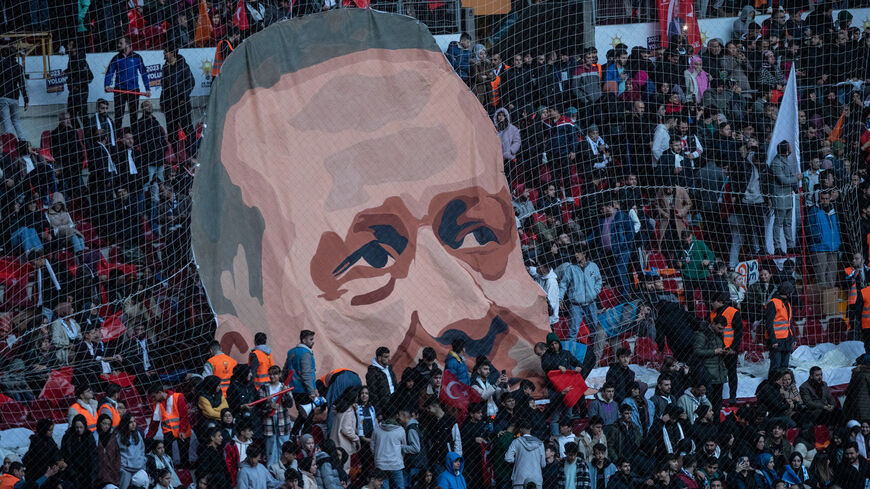Turkey’s economic growth — a goal that President Recep Tayyip Erdogan has adamantly pursued at the expense of an inflation storm — is running out of steam ahead of crucial elections next year, lead indicators released this week show.
The country’s industrial output, the backbone of economic growth, has lost pace since July and expanded by a relatively modest 2.5% in October from the same month last year, according to the official data. In some major industries, production contracted. In the mining and energy generation sectors, for instance, it shrank by 7.4% and 4.8% year-on-year, respectively.
This and other lead indicators signal that growth has sharply slowed in the fourth quarter, meaning a growing risk that the economy might begin to stagnate ahead of the presidential and parliamentary polls due by June 2023.
In an exclusive Al-Monitor/Premise poll released this month, the economy is the top priority for voters. According to the poll, breakneck inflation and skyrocketing prices stand out as the major issue complicating Erdogan’s reelection bid with 67% of respondents believing the economy is the most important challenge that Turkey is facing.
There are also signs of a slowdown in the foreign trade data. The country’s exports were worth $21.3 billion in October, decreasing by $1.3 billion from September. The European Union, the main market of Turkish exporters, has been grappling with double-digit inflation that has curbed the demand for imports. Turkish exporters have yet to find alternative markets to make up for the sagging European demand. Furthermore, restrictions on how exporters use their hard-currency earnings, enforced by Ankara to prop up the embattled Turkish lira, appear to have dampened their motivation.
The Purchasing Managers’ Index (PMI) of the Istanbul Chamber of Industry points to worsening business conditions in the manufacturing sector under the impact of weakening global demand. The headline manufacturing PMI was 45.7 in November, down from 46.4 in October and below the 50.0 no-change mark for the ninth month running.
“In fact, the moderation in business conditions was the most pronounced since the opening wave of the COVID-19 pandemic in early 2020,” the report said. The index is derived from indicators for new orders, output, employment, suppliers’ delivery times and stocks of purchases, with any figure greater than 50 indicating overall improvement.
Amid economic uncertainties fueled by Ankara’s moves to suppress exchange rates and a series of unorthodox rate cuts by the central bank, the appetite for investment has also declined. Investments dropped 1.3% in the third quarter, with the downtick expected to have continued in the fourth one.
The Turkish economy’s full-year growth is projected at 5% — both by Ankara and the International Monetary Fund — but the rate is increasingly likely to reach only about 4%.
Erdogan has relentlessly promoted growth since last year. Heeding the president’s pressure, the central bank began to cut its policy rate in September 2021 at the expense of fanning inflation, which stood at 19.5% at the time. The economy grew a spectacular 11.4% in 2021, driven by pent-up demand after the removal of pandemic restrictions, while inflation soared to 36% by the year end. The surge in prices continued in 2022, with annual inflation peaking to 85.5% in October.
Cooling the economy is the conventional way to rein in inflation, but Erdogan has insisted on growth, hoping that a lively economy will better serve his political fortunes. The central bank’s rate cuts have totaled 10 percentage points since September 2021, with its policy rate now standing at 9%.
Economic growth in the first two quarters relied heavily on domestic demand as the surging inflation sent consumers rushing to buy durable goods and stock up on food before prices increased further. Among the well-off, many invested in cars and homes to protect the value of their money against inflation. As a result, gross domestic product grew 7.7% in the first quarter and 7.5% in the second one. The third quarter, however, saw the first signs of fatigue, with the growth rate dropping to 3.9%.
Household consumption and exports remained the main drivers of growth in the third quarter, while the impact of stocks and investments was negative. Yet, the boosting effect of household consumption and exports is unlikely to remain as strong down the road. For one, the post-pandemic demand and the rush for goods against inflation appear to be coming to an end. The demand for imports, meanwhile, is expected to rise due to the relative stability of foreign exchange prices, which owes much to the foreign currency inflows from “friendly countries” that Ankara has sought to increase in recent months.
It remains unclear how Erdogan will respond to the slowing economic growth in the run-up to the elections, and whether he will roll out pay hikes to minimum-wage earners, public servants and pensioners by the year end, or follow up with cheap consumer loans to stoke demand. The opposition — standing its strongest chance yet to end Erdogan’s two-decade rule — is probably reckoning that he would go to any lengths, braving any economic and political costs.







